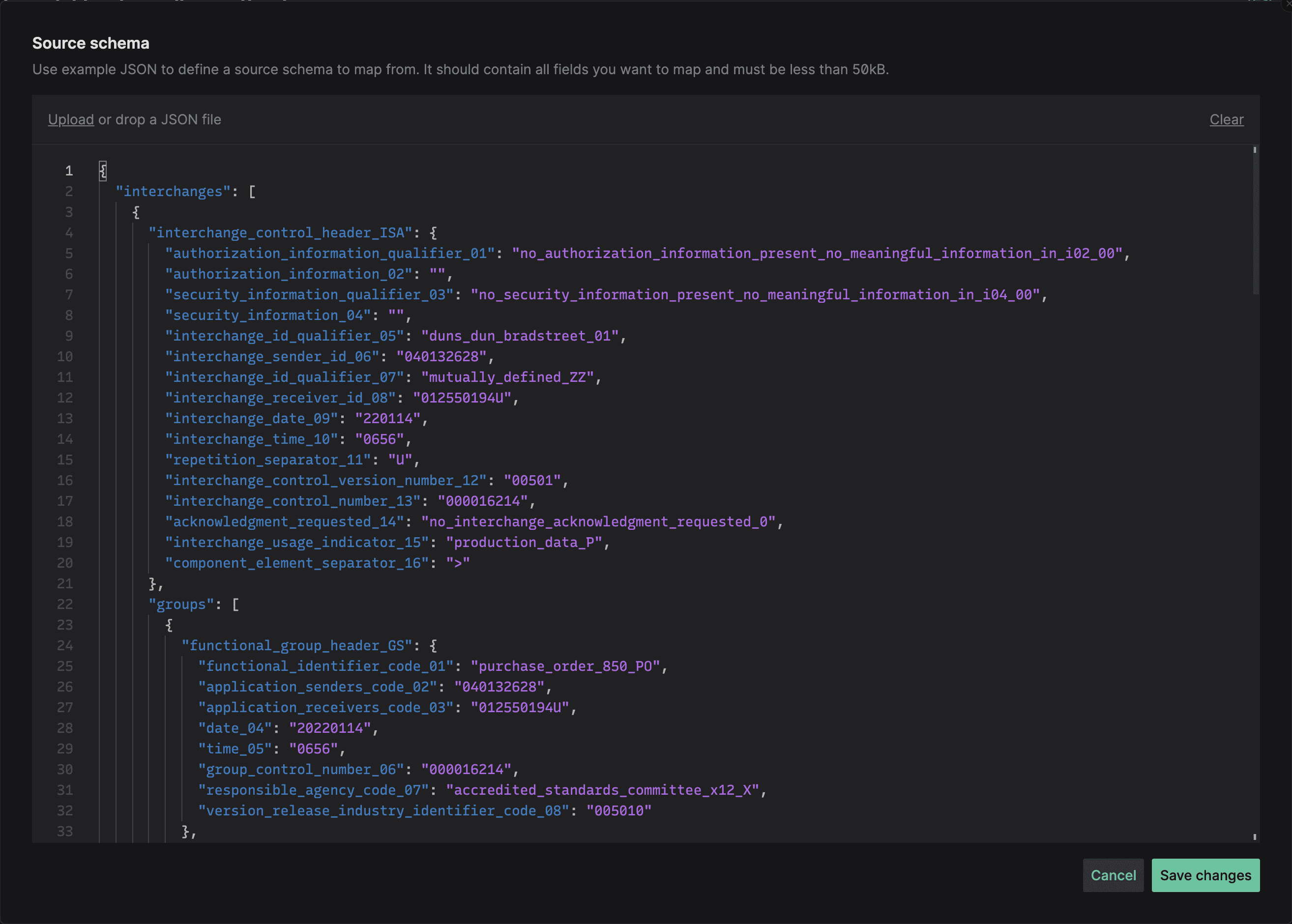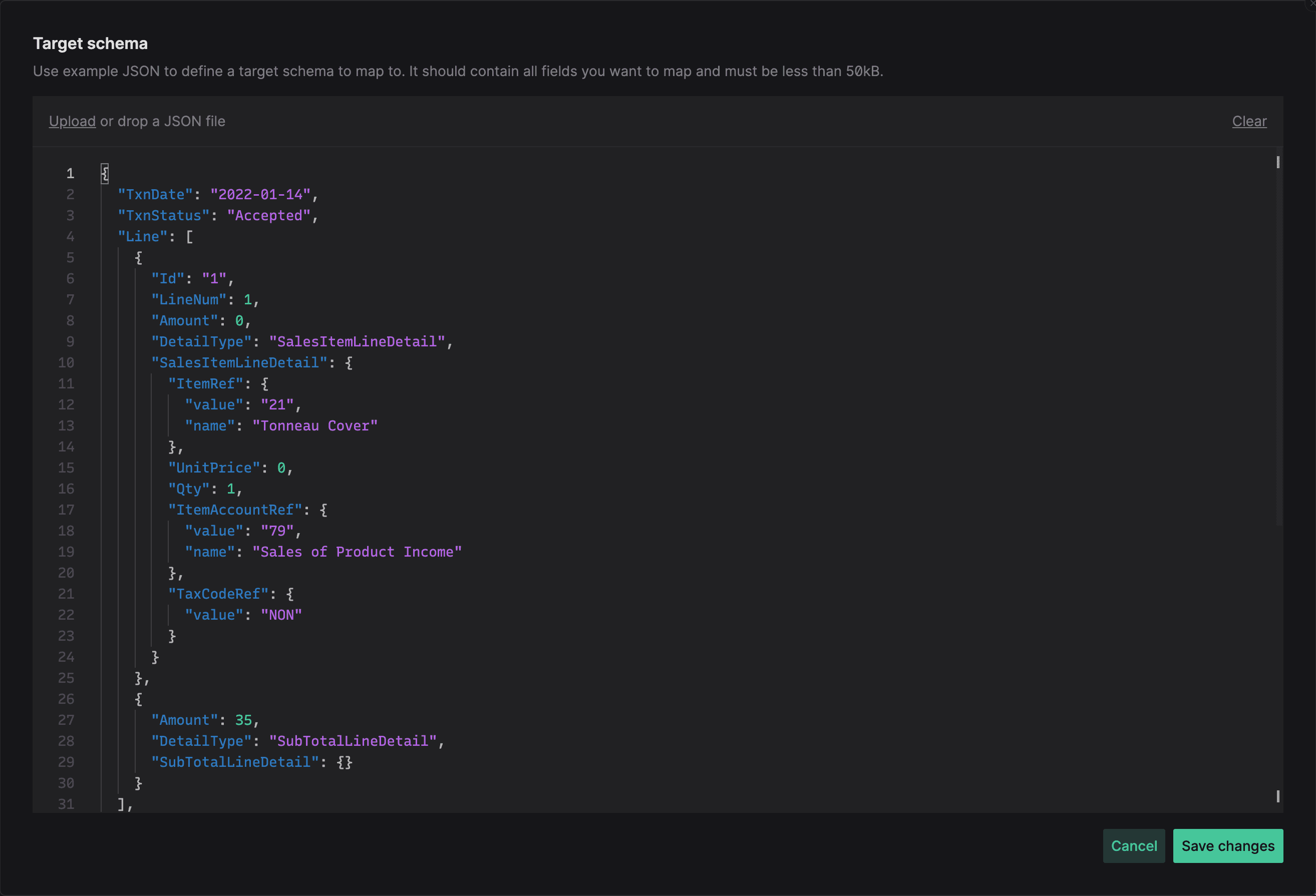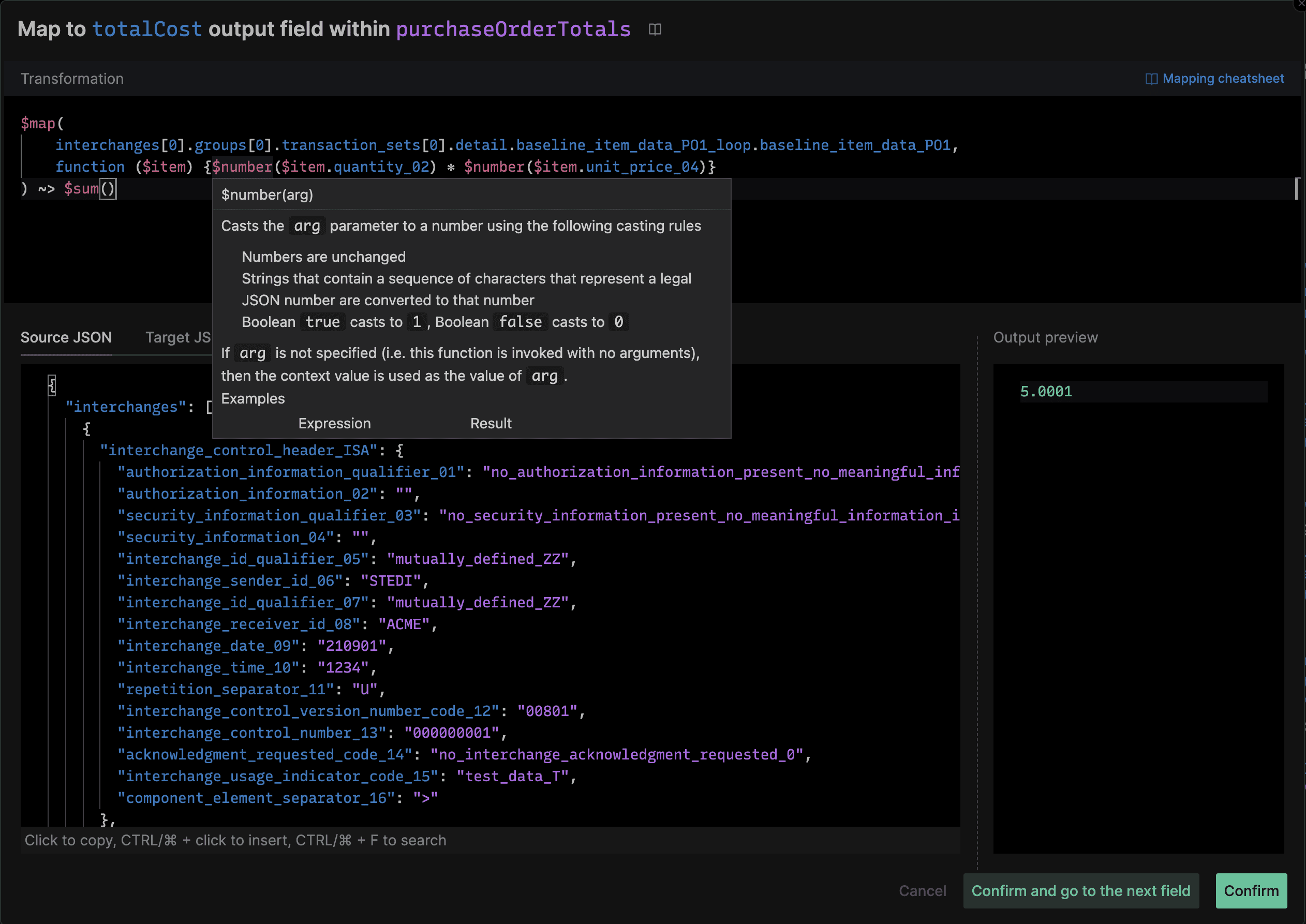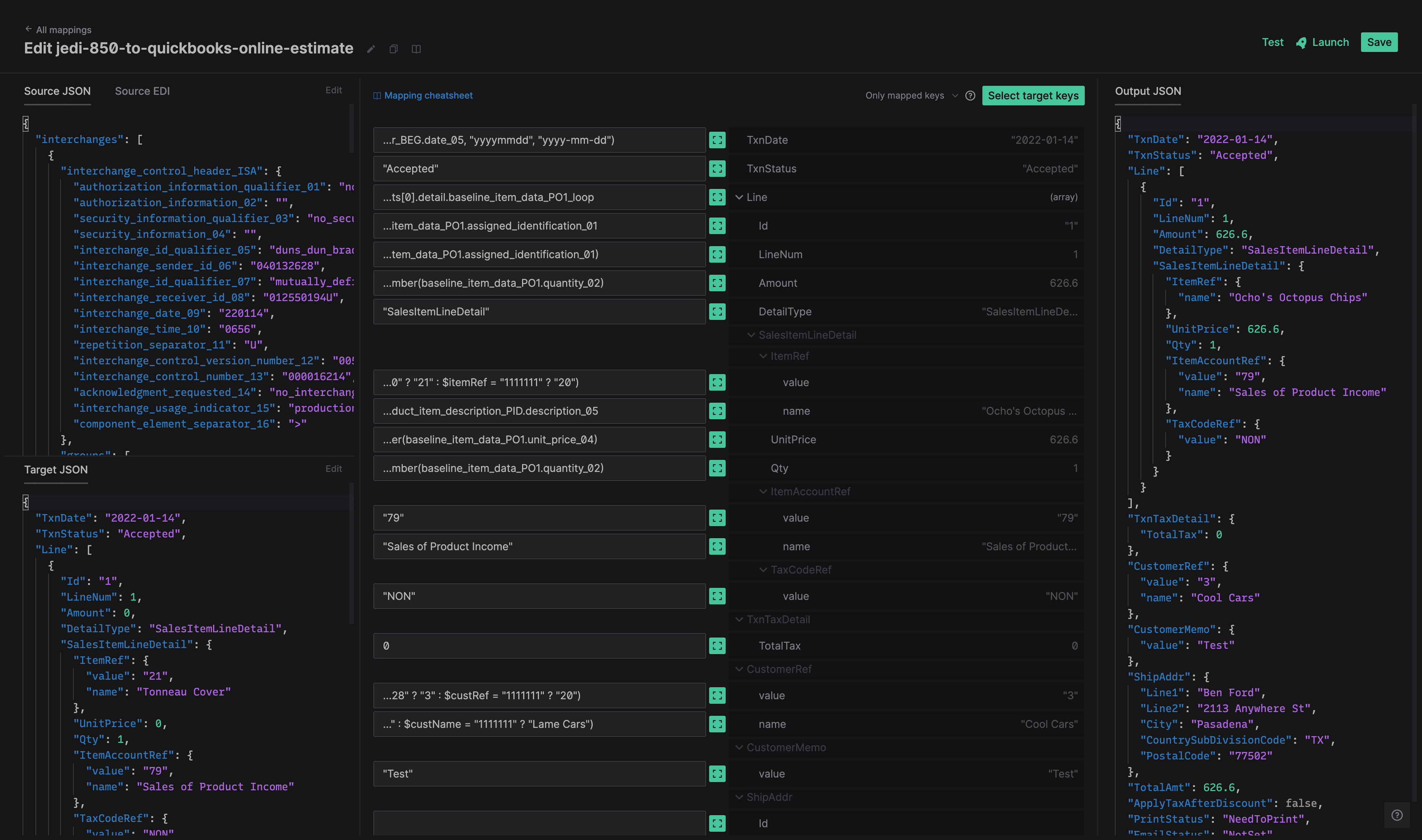Complex data transformations made simple with Mappings
Jan 26, 2022
Products
Business integrations are anything but straightforward – they are typically composed of many steps that need to be executed sequentially to process a single business transaction.
At a high level, each step can be divided into one of two categories: transporting data and transforming data. In order to enable developers to implement all manner of data transformations with ease, we've built Mappings.
Introducing Mappings
Mappings is a robust JSON-to-JSON data transformation engine that enables developers to define field mappings in an intuitive UI – and then invoke those mappings programmatically via an API.
Mappings is composed of two parts:
a browser-based tool that allows users to create and test JSON-to-JSON data transformations
an API that can be used to programmatically invoke defined mappings at web scale.
Here's a look at the UI...

...and the corresponding API call:
Using Mappings, developers can transform JSON payloads without the need to write, provision, maintain, or monitor any infrastructure. Mappings is powered by an open-source query and transformation language called JSONata, which comes with a large number of built-in functions and expressions.
Mappings allows developers to solve common tasks like retrieving data from nested structures, manipulating strings, writing conditional expressions, parsing/converting dates, transforming data (with filter, map, reduce functions) and much more.
Using Mappings
As an example, let's build a mapping between an 850 Purchase Order and a QuickBooks Online Estimate. The Purchase Order is in the X12 EDI format; since Mappings works with JSON as its input and output formats, we need to translate it to JSON first. You can read how to do that here.
Now that we have a JSON source document to start with, we can create a new mapping by navigating to Mappings in Stedi. We'll input the JSON as the source in the first step of the Mapping wizard…

…and we'll input the target JSON in the next step:

With our source and target selected, we can start building a transformation between them by writing simple functions and expressions:

The Mappings UI has autocomplete functionality and built-in documentation. Together, these facilitate a seamless experience for building complex data transformations:

Each mapping can be tested in the UI…

…and executed at web scale using the API.
Mappings is now Generally Available
Mappings allows you to create your own data transformation API - without the need to write, provision, maintain or monitor any code; you focus on building your business logic and we’ll do the rest for you.
Business integrations are anything but straightforward – they are typically composed of many steps that need to be executed sequentially to process a single business transaction.
At a high level, each step can be divided into one of two categories: transporting data and transforming data. In order to enable developers to implement all manner of data transformations with ease, we've built Mappings.
Introducing Mappings
Mappings is a robust JSON-to-JSON data transformation engine that enables developers to define field mappings in an intuitive UI – and then invoke those mappings programmatically via an API.
Mappings is composed of two parts:
a browser-based tool that allows users to create and test JSON-to-JSON data transformations
an API that can be used to programmatically invoke defined mappings at web scale.
Here's a look at the UI...

...and the corresponding API call:
Using Mappings, developers can transform JSON payloads without the need to write, provision, maintain, or monitor any infrastructure. Mappings is powered by an open-source query and transformation language called JSONata, which comes with a large number of built-in functions and expressions.
Mappings allows developers to solve common tasks like retrieving data from nested structures, manipulating strings, writing conditional expressions, parsing/converting dates, transforming data (with filter, map, reduce functions) and much more.
Using Mappings
As an example, let's build a mapping between an 850 Purchase Order and a QuickBooks Online Estimate. The Purchase Order is in the X12 EDI format; since Mappings works with JSON as its input and output formats, we need to translate it to JSON first. You can read how to do that here.
Now that we have a JSON source document to start with, we can create a new mapping by navigating to Mappings in Stedi. We'll input the JSON as the source in the first step of the Mapping wizard…

…and we'll input the target JSON in the next step:

With our source and target selected, we can start building a transformation between them by writing simple functions and expressions:

The Mappings UI has autocomplete functionality and built-in documentation. Together, these facilitate a seamless experience for building complex data transformations:

Each mapping can be tested in the UI…

…and executed at web scale using the API.
Mappings is now Generally Available
Mappings allows you to create your own data transformation API - without the need to write, provision, maintain or monitor any code; you focus on building your business logic and we’ll do the rest for you.
Business integrations are anything but straightforward – they are typically composed of many steps that need to be executed sequentially to process a single business transaction.
At a high level, each step can be divided into one of two categories: transporting data and transforming data. In order to enable developers to implement all manner of data transformations with ease, we've built Mappings.
Introducing Mappings
Mappings is a robust JSON-to-JSON data transformation engine that enables developers to define field mappings in an intuitive UI – and then invoke those mappings programmatically via an API.
Mappings is composed of two parts:
a browser-based tool that allows users to create and test JSON-to-JSON data transformations
an API that can be used to programmatically invoke defined mappings at web scale.
Here's a look at the UI...

...and the corresponding API call:
Using Mappings, developers can transform JSON payloads without the need to write, provision, maintain, or monitor any infrastructure. Mappings is powered by an open-source query and transformation language called JSONata, which comes with a large number of built-in functions and expressions.
Mappings allows developers to solve common tasks like retrieving data from nested structures, manipulating strings, writing conditional expressions, parsing/converting dates, transforming data (with filter, map, reduce functions) and much more.
Using Mappings
As an example, let's build a mapping between an 850 Purchase Order and a QuickBooks Online Estimate. The Purchase Order is in the X12 EDI format; since Mappings works with JSON as its input and output formats, we need to translate it to JSON first. You can read how to do that here.
Now that we have a JSON source document to start with, we can create a new mapping by navigating to Mappings in Stedi. We'll input the JSON as the source in the first step of the Mapping wizard…

…and we'll input the target JSON in the next step:

With our source and target selected, we can start building a transformation between them by writing simple functions and expressions:

The Mappings UI has autocomplete functionality and built-in documentation. Together, these facilitate a seamless experience for building complex data transformations:

Each mapping can be tested in the UI…

…and executed at web scale using the API.
Mappings is now Generally Available
Mappings allows you to create your own data transformation API - without the need to write, provision, maintain or monitor any code; you focus on building your business logic and we’ll do the rest for you.
Share
Get started with Stedi
Get started with Stedi
Automate healthcare transactions with developer-friendly APIs that support thousands of payers. Contact us to learn more and speak to the team.
Get updates on what’s new at Stedi
Get updates on what’s new at Stedi
Get updates on what’s new at Stedi
Developers
Resources
Get updates on what’s new at Stedi
Backed by
Stedi is a registered trademark of Stedi, Inc. All names, logos, and brands of third parties listed on our site are trademarks of their respective owners (including “X12”, which is a trademark of X12 Incorporated). Stedi, Inc. and its products and services are not endorsed by, sponsored by, or affiliated with these third parties. Our use of these names, logos, and brands is for identification purposes only, and does not imply any such endorsement, sponsorship, or affiliation.
Get updates on what’s new at Stedi
Backed by
Stedi is a registered trademark of Stedi, Inc. All names, logos, and brands of third parties listed on our site are trademarks of their respective owners (including “X12”, which is a trademark of X12 Incorporated). Stedi, Inc. and its products and services are not endorsed by, sponsored by, or affiliated with these third parties. Our use of these names, logos, and brands is for identification purposes only, and does not imply any such endorsement, sponsorship, or affiliation.
Developers
Resources
Get updates on what’s new at Stedi
Backed by
Stedi is a registered trademark of Stedi, Inc. All names, logos, and brands of third parties listed on our site are trademarks of their respective owners (including “X12”, which is a trademark of X12 Incorporated). Stedi, Inc. and its products and services are not endorsed by, sponsored by, or affiliated with these third parties. Our use of these names, logos, and brands is for identification purposes only, and does not imply any such endorsement, sponsorship, or affiliation.